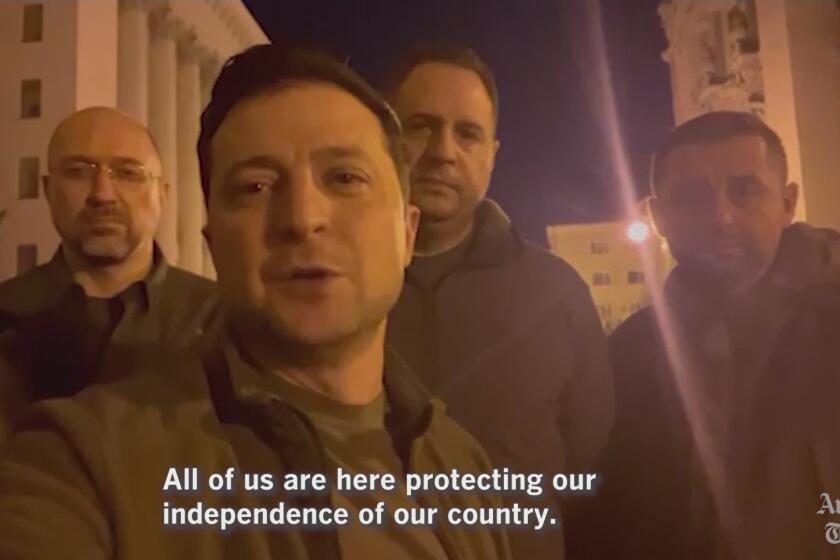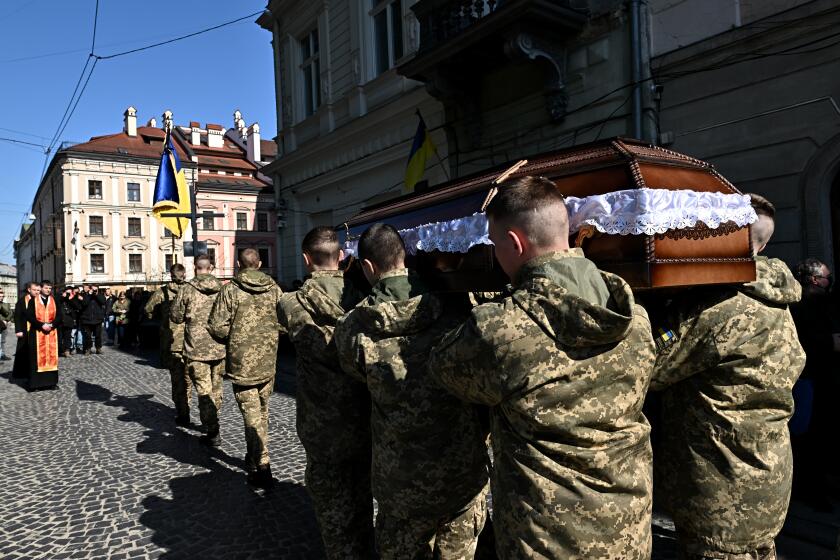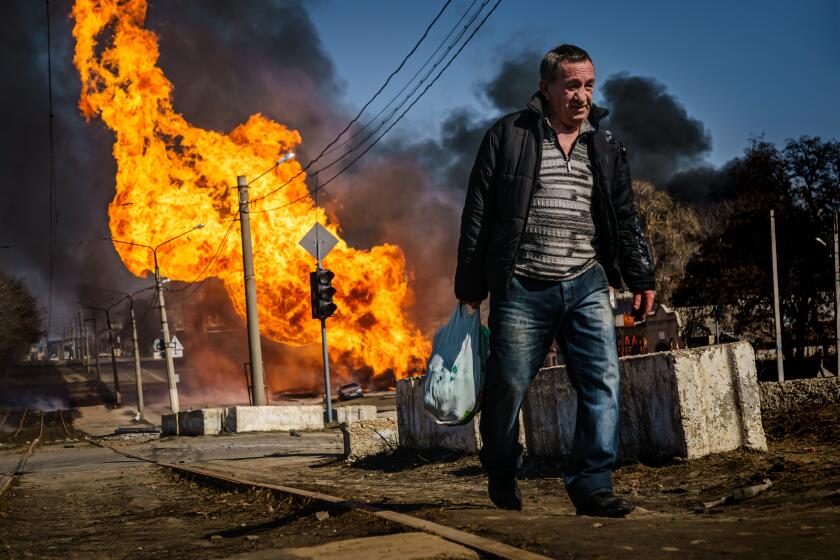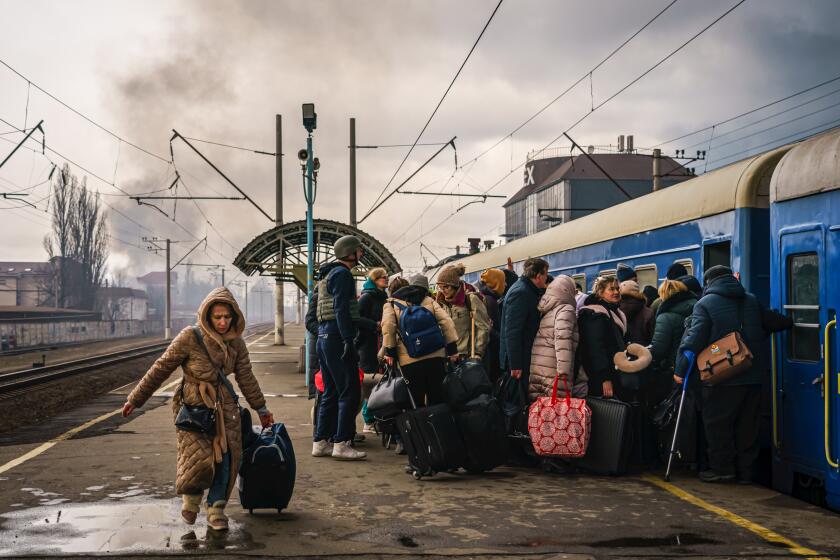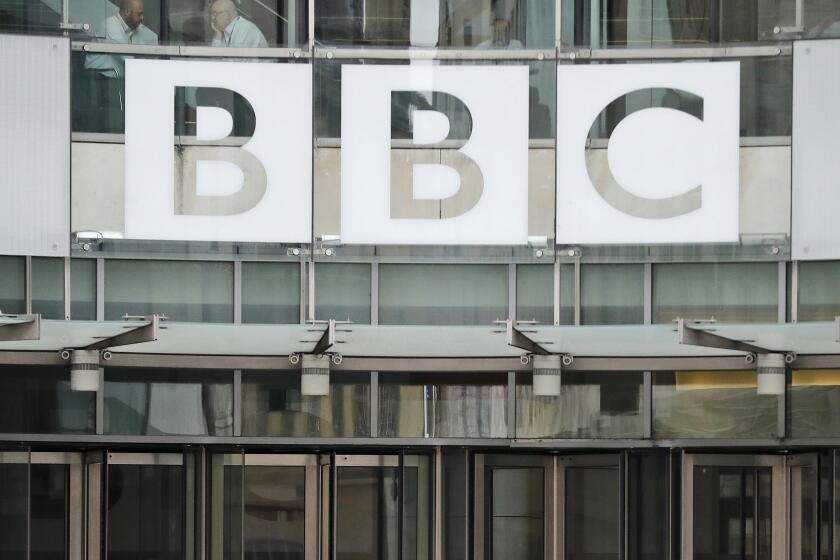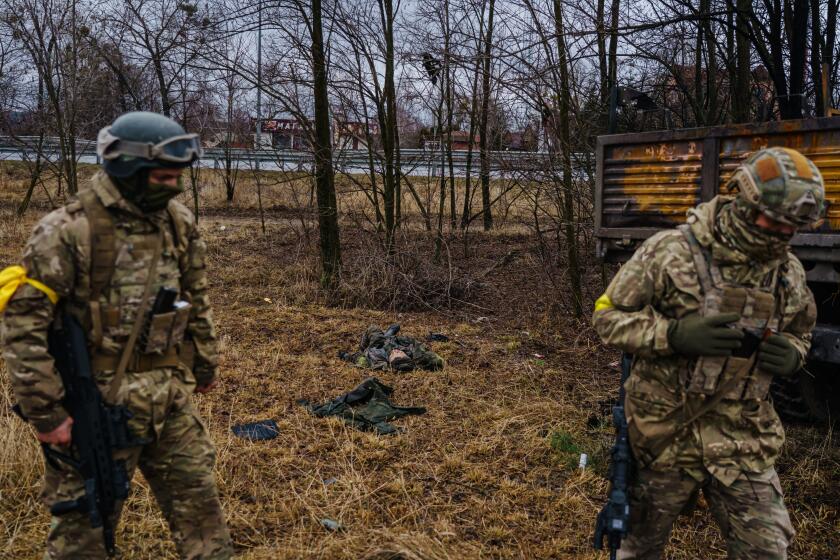Putin issues new threats on Ukraine; cease-fire quickly breaks down

Civilians leave Friday as fighting between Russian and Ukrainian forces draws closer to the town of Irpin, near Kyiv.
- Share via
KYIV, Ukraine — As hospitals filled with bloodied civilians and Ukrainian protesters in multiple Russian-occupied cities defiantly waved blue and yellow national flags, Russian President Vladimir Putin destroyed any hope Saturday of immediate de-escalation of his invasion of Ukraine, threatening in a televised speech to strip Ukraine of its statehood and likening a series of sweeping Western sanctions to a “declaration of war.”
Ukrainian President Volodymyr Zelensky’s social media savvy has helped give Ukraine a fighting chance against the Kremlin’s massive army and disinformation juggernaut.
“If they continue to do what they are doing, they are calling into question the future of Ukrainian statehood,” Putin said of Ukrainian leaders during a meeting with flight attendants from Russian airline Aeroflot, which has grounded nearly all of its international flights in the face of withering Western sanctions that have sent the ruble tumbling. “If this happens, it will be entirely on their conscience.”
It was one of the clearest signs yet that Putin’s unprovoked invasion of Ukraine may be part of a plan to reconstruct sections of the Soviet Union, whose 1991 collapse Putin has lamented as the “greatest geopolitical catastrophe” of the last century and “a genuine tragedy” for his people.
While Putin continued to step up censorship at home, blocking access to Facebook and some foreign news sites in a bid to limit Russians’ knowledge of the conflict, Ukrainian President Volodymyr Zelensky pleaded for international assistance, telling nearly 300 U.S. lawmakers from both chambers of Congress that his country desperately needs more air power.
In particular, according to a congressman on the call, Zelensky asked for U.S. help in securing older Russian fighter planes that Poland, Bulgaria and Romania possess and which Ukrainian pilots already know how to operate.
The U.S. and other NATO countries have moved cautiously when it comes to providing direct military assistance to Ukraine — refusing to declare a no-fly zone over the country out of fear that it would dramatically escalate the war. But U.S. lawmakers from across the political spectrum appeared eager Saturday to help provide Ukraine with more armaments.
Almost 800,000 Ukrainians have fled to Poland as Russian forces push farther into Ukraine.
Rep. John Garamendi (D-Walnut Grove), who was in the virtual meeting with Zelensky, said in an interview that it was “more than possible” for the aircraft to be transferred to Ukraine and called for swift passage in Congress of a $10-billion emergency aid package for Ukraine and NATO allies.
Sen. Ben Sasse (R-Neb.) was one of multiple lawmakers who released statements saying they support sending fighter aircraft to the beleaguered nation.
“Ukraine needs air power urgently and America should send it,” Sasse said. “Americans should absolutely send Ukrainians planes, helicopters and [drones]. Let’s resupply Ukraine’s air force today.”
The U.S. and the European Union have imposed unprecedented sanctions in recent days aimed at strangling Russia’s economy and slowing its war machine. And on Saturday, Mastercard and Visa announced they were suspending their operations in Russia, the latest blow to the country’s financial system.
The sanctions have left Russia’s economy in free-fall and Putin more isolated politically than at any point in the past.
One of Russia’s remaining allies is China, which has said that while it believes the sovereignty of all nations should be respected, it also believes sanctions are ineffective. In a call Saturday, Chinese Foreign Minister Wang Yi told U.S. Secretary of State Antony J. Blinken that China opposes any moves that “add fuel to the flames” in Ukraine and called for negotiations to resolve the immediate crisis.
The State Department said Blinken responded by saying Putin needs to pay a high price for Russia’s aggression.
Like China, Israel has been loath to criticize Russia. On Saturday, Israeli Prime Minister Naftali Bennett traveled to Moscow to meet with Putin. The leaders spoke for three hours, according to Bennett’s office, although the content of the conversation was not made public.
On Saturday night, President Biden spoke with Zelensky, saying he welcomed the actions by the credit card firms and that he is working closely with Congress to secure additional funding for Ukraine.
The rising geopolitical tensions — which were further heightened Saturday when Russian customs officials announced they had arrested an American pro basketball star, identified as Brittney Griner of the WNBA’s Phoenix Mercury, on drug charges at a Moscow airport last month — came amid the swift breakdown of a cease-fire agreement meant to allow the exit of civilians from war zones.
The Times’ Marcus Yam, no stranger to war photography, gives a first-person account from Ukraine.
The first cease-fire since Russia invaded Ukraine nine days earlier fell apart within an hour Saturday when Russian forces resumed shelling two besieged southern cities.
The cease-fire had been set to begin at 9 a.m. Kyiv time under an agreement with the Ukrainian government, the Russian Defense Ministry said, making it the first concrete sign of cooperation between the two sides after they decided in negotiations this week to create humanitarian corridors aimed at evacuating civilians from conflict areas. Ukrainian and Russian leaders are expected to hold another round of talks on Monday.
Pavlo Kirilenko, head of the Ukrainian government’s regional military administration in the eastern province of Donetsk, confirmed the cease-fire and evacuation of Mariupol in a post on Facebook. The city of Volnovakha was also covered by the agreement.
But about an hour after the evacuation began, at 11 a.m. Kyiv time, Russian forces resumed shelling, making it impossible to move people out safely, Mariupol’s deputy mayor said. By 1 p.m., the Donetsk regional administration suspended the evacuation effort, with residents advised to head to shelters and abandon the gathering points where municipal buses were to spirit them out of the city.
The designated safe corridor from Mariupol was supposed to stretch about 140 miles northwest to the city of Zaporizhzhia, close to the site of a nuclear power plant that was set ablaze during shelling Friday.
Before the evacuation began, Kirilenko called on residents with their own vehicles to “take people with you, fill your vehicle as much as possible.”
People clamored to board trains, fled on foot and navigated a river Friday to escape Irpin, Ukraine, as Russian forces continued their advance toward the capital, Kyiv.
The announcement of the cease-fire agreement came as Russian forces have pressed the attack in Ukraine’s south, the one area of the country where their campaign appears to be making gains.
Mariupol, a southeastern port city of nearly 450,000 people, has suffered a relentless Russian barrage for days and appears to be surrounded. Photos and video published by the Associated Press showed a hospital filled with young victims who could not be saved: an 18-month-old baby named Kirill, a teen boy struck by bombs while playing soccer with friends, a 6-year-old girl who died in her pajamas.
A takeover of the city would further consolidate Russia’s gains on the Black Sea coast and create an overland link with Crimea, which Moscow annexed illegally in 2014. That would then serve as a springboard for an all-out assault on Odesa, the crown jewel of Ukraine’s coastal cities.
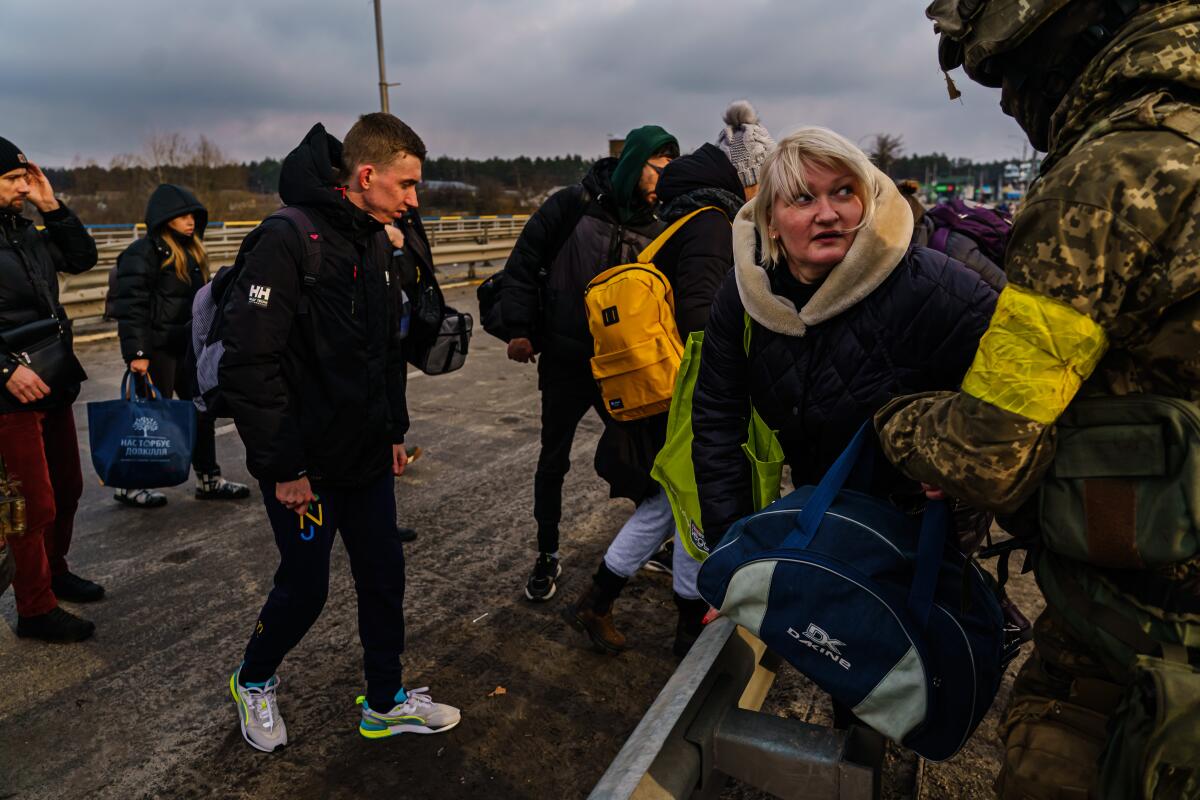
Despite the attempted cease-fire in the south, fighting persisted elsewhere in the country Saturday. Kharkiv, Ukraine’s second-largest city and a prime target of Russia’s assault over the last 10 days, saw another bout of shelling in the early morning, with observers on social media reporting rocket attacks. Local news outlets also reported shelling in the city of Sumy, about 90 miles northwest of Kharkiv.
Russian President Vladimir Putin intensified a crackdown on media outlets blocking Facebook and Twitter and signing into law a bill that criminalizes what Moscow deems to be “fake” reports.
In the village of Markhalivka, 13 miles southwest of Kyiv’s center and ostensibly near a humanitarian corridor allowing residents to escape the capital, an airstrike Friday left a rubble-filled crater and killed six people — including a 12-year-old girl.
Her father, Igor Majayev, a 54-year-old driver, sifted through the ruins of what had been his two-story home on Saturday.
“What can I say?” he said, pausing for a moment to take in the totality of the destruction. When the strike happened, Majayev was lying down in the room next to where his daughter, Masha, was sleeping.
“This was her wheelchair,” he said in a daze. Now, she’s dead. So is his wife, Anya. Two grandchildren, 7 and 8 years old, were injured and taken to a hospital in nearby Vasylkiv.
“Never in my life did I imagine this situation, and from Russia,” he said.
“Western countries warned us, but we just didn’t believe this would happen.”
The Ukrainian Defense Ministry maintains that more than 10,000 Russian soldiers have been killed or injured and hundreds of military units — including tanks, helicopters and other aircraft — destroyed in the fighting. The figures could not be independently verified.
Russia has acknowledged that about 500 of its soldiers have been killed and 1,500 others injured.
The civilian death toll is also mounting. The United Nations office for human rights said 331 civilians have been killed and 675 others injured since the start of hostilities on Feb. 24 up until Thursday, although the agency says that is almost certainly an undercount.
Those who could, fled.
On the southwestern highway out of Kyiv, an ever-growing mass of vehicles stretched for miles before the last checkpoint out of the capital.
Every journey out now takes hours through innumerable checkpoints, with testy residents-turned-reservists, blithely resting well-used hunting rifles — barrel aimed squarely at the car — watching for any untoward sign of Russian saboteurs.
Toward the northwest, where the fighting near Kyiv was at its strongest, cars raced on the western highway away from Bucha and Irpin, two towns near the Russian column. Many had white rags tied to the antenna or raised from a pole out the window. Others spelled out “Deti,” which means children, in masking tape on the hoods.
Among the 1.45 million Ukrainians who have escaped Ukraine, according to the United Nations, more have ended up in Poland than in any other country.
Blinken went there Saturday to thank Polish leaders for receiving tens of thousands of Ukrainian refugees daily and for hosting the deployment of U.S. military personnel, whose presence along the eastern flank of NATO territories has been expanded in recent weeks.
“At this moment of crisis for millions of Ukrainians — and as the security of Europe hangs in the balance — Poland has stepped forward with generosity, with leadership, with resolve,” Blinken said.
Polish Foreign Minister Zbigniew Rau said Poland has already received 700,000 Ukrainians fleeing the war and expected hundreds of thousands more, creating a “humanitarian crisis of an unimaginable scale.”
Rau was more forceful than many Western leaders in denouncing what he called war crimes committed by Russia. “The way in which Russia conducts hostilities, based on the desire to break the will of Ukrainian resistance by means of attacks that terrorize civilian population — shelling residential areas, nuclear power plants, and non-military venues — are war crimes,” Rau said.
The International Criminal Court says it has started an investigation into potential war crimes in Ukraine.
After meeting with Ukrainians who fled their homes to neighboring Poland, Blinken stepped across the border, ever so briefly, into Ukraine in a symbolic show of support. He was joined by his Ukrainian counterpart, Dmytro Kuleba, who repeated Ukraine’s need for a no-fly zone, a potentially precarious arrangement that the U.S. and NATO have so far rejected.
“If we lose the skies,” Kuleba said, “there will be much, much more blood on the ground, and it will be the blood of civilians.”
Bulos reported from Kyiv, Linthicum from Mexico City and Wilkinson from Washington. Times staff writers Henry Chu in London and Nolan D. McCaskill and Jennifer Haberkorn in Washington contributed to this report.
Russia’s war losses in Ukraine are far higher than Moscow admits, analysts believe. But will that spark anti-Putin sentiment?
More to Read
Sign up for Essential California
The most important California stories and recommendations in your inbox every morning.
You may occasionally receive promotional content from the Los Angeles Times.
